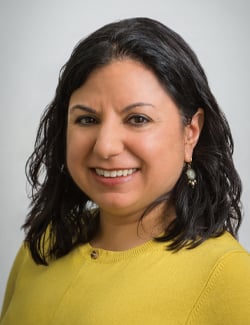Q&A: Diabetes Awareness
According to the Center for Disease Control reports in 2020, 34.2 million people in the United States have Diabetes which is about 1 in every 10 people. Of those, 1 in 5 people are not aware they have diabetes.
To learn more about Diabetes, we connected to Dr. Yasmine Khan, ECHN Medical Group Endocrinologist.

Q: What is an Endocrinologist?
A: Endocrinologists are specially trained physicians who diagnose diseases related to the glands that produce hormones that are part of the endocrine system. An endocrinologists’ goal is to restore the hormonal balance in the body.
Q: What is diabetes?
A: Diabetes is a disease that occurs when your pancreas does not produce enough insulin, or the body cannot use the insulin correctly. The pancreas is a gland behind the stomach that helps digest food and produce important hormones that includes insulin that helps with processing of glucose in the body.
Q: What are the risk factors for diabetes?
A: The most common type of diabetes is Type 2 diabetes. Other kinds such as Type 1 diabetes and Monogenic diabetes are inherited diseases.
Type 2 diabetes also has genes that predispose an individual, however multiple studies show that Type 2 diabetes can be prevented or delayed. Typical risk factors include obesity, certain medications, sedentary lifestyle, your family history, and ethnicity, especially if you are Hispanic, African American, or American Indian.
For a woman having had diabetes during pregnancy i.e. gestational diabetes increases her risk for Type 2 Diabetes. A history of Polycystic Ovarian Syndrome in women is a risk factor for developing diabetes as well.
Q: How can you prevent Type 2 diabetes?
A: Studies done in humans have shown that the most powerful way to prevent Type 2 diabetes is by therapeutic lifestyle change, otherwise known as Diabetes Prevention Program (Prevent T2). This includes maintaining a healthy lifestyle with adequate exercise and healthy food choices to prevent excessive weight gain. This nationally recognized program is a one-year program offered at the Diabetes Wellness Center.
Q: How can one manage their diabetes?
A: It is very important to have a good understanding of the disease. At diagnosis or even prior (pre-diabetes) it is very important to have education in self-management of diabetes. Your doctor can help you find a program near you that is American Diabetes Association (ADA) certified. Other resources include websites – the ADA’s website that has a lot of information that can help you learn and understand the disease to help you manage your diabetes.
There are multiple medications that are available that work differently in the body that can help lower your blood sugar and manage your diabetes. Not all medications are appropriate for everyone and it is important to consult your physician or Endocrinologist for advice.
Q: What resources are available through ECHN to manage diabetes?
A: ECHN's Center for Healthy Living is staffed by a talented and dedicated group of diabetes educators and dietitians that are part of an ADA certified program. They offer classes and programs for diabetes self-management, gestational diabetes management, a free diabetes prevention program, nutritional counseling and so much more.
Q: Any last tips /comments to the community?
A: As an Endocrinologist I am very passionate about the importance of prevention of disease and treatment to prevent complications of diabetes which are devastating for the individual and a source of immense sorrow for their families. In addition to learning the tools of managing diabetes, it is very important to look for social and emotional hurdles in your life which make it difficult to change your lifestyle. Ask your diabetes educator or physician to help guide you find the solutions for these problems.




